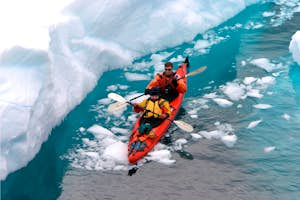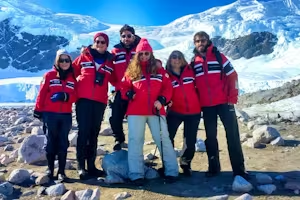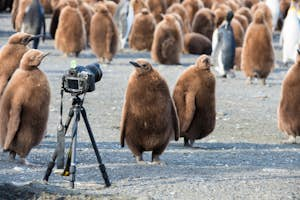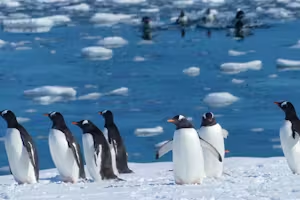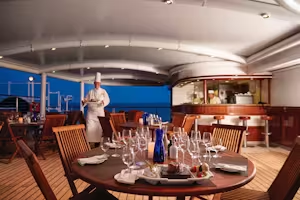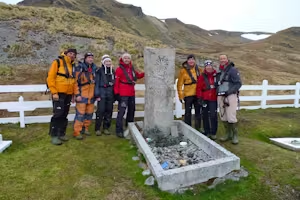Avian Flu & Antarctica
- Avian Flu has been present on the Antarctic Peninsula since February 2024, having been introduced naturally by migrating birds
- The arrival of Avian Flu was anticipated and plans were already place to manage its effects
- Simple biosecurity procedures have allowed expedition cruise ships to continue visiting Antarctica with unchanged itineraries
- Swoop has sent thousands of travellers to Antarctica throughout this period, with our customers continuing having brilliant polar experiences
- We're constantly monitoring the situation so we can keep all our travellers fully informed throughout their journey with us
What is Avian Flu?
Avian Flu is a naturally existing virus found in wild bird populations that is spread by faeces and respiratory secretions. While most strains of the virus are harmless, the H5N1 strain (also known as Highly Pathogenic Avian Influenza or HPAI) carries a much higher risk to animals. Although it mainly affects birds, a substrain has been shown to affect some wild mammal species living in close quarters with infected birds. It carries a very low risk to humans.
Since 2020, the HPAI strain has been spread by migratory birds across Asia, Europe and North and South America, causing widespread mortality, particularly among seabird populations. In late 2023 it arrived on South Georgia, and was first detected on the Antarctic Peninsula in February 2024. Its effects have mainly been seen among skuas, elephant seals and fur seals.
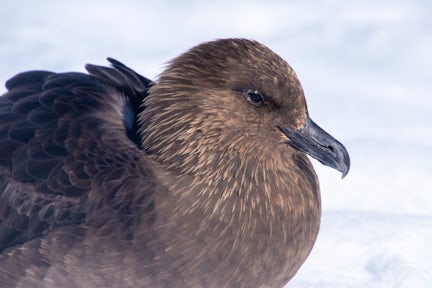
Visiting the Antarctic Peninsula
The arrival of Avian Flu on the Antarctic Peninsula near the end of the 2024 by migrating birds was an event that had been planned for. The International Association of Antarctic Tour Operators (IAATO) introduced precautionary biosecurity measures for all ships and visitors that have been operating successfully since 2022. Swoop is proud to be a member of IAATO.
Avian Flu was initially detected in locations that were already designated as areas for zodiac cruising only. Expedition cruise ships continued to successfully visit Antarctica, with no effect on itineraries. Swoop has continued to successfully send travellers to the Antarctic Peninsula throughout this period.
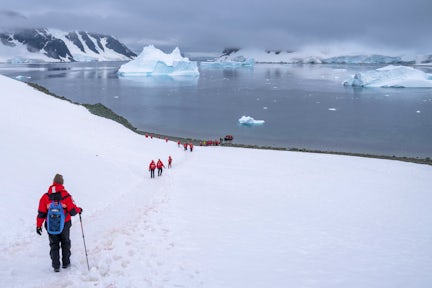
What this means for your trip
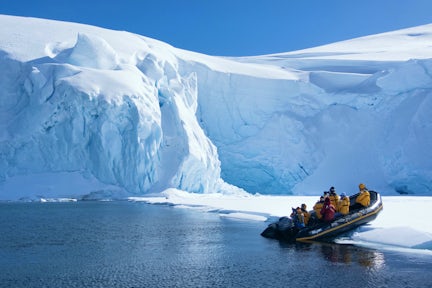
The Antarctic Peninsula remains open for exploration. The great size of the Antarctic Peninsula and the number and variety of landing sites along its 450 mile length, give ships great flexibility in avoiding any areas potentially affected by Avian Flu.
The arrival of Avian Flu has been anticipated and planned for by IAATO and our Antarctic cruise ship operators, with heightened biosecurity measures operating successfully since the end of 2022. These measures and constant monitoring have enabled ships to continue to offer the best of Antarctica to visitors.
Expedition teams continue to make sure that visitors aren’t an added vector for Avian Flu. Simple biosecurity measures include the thorough cleaning of your kit and boots both before and after landings, and a ban on sitting, kneeling or squatting on the ground. Your expedition team will cover this in detail when you’re aboard.
Since the arrival of Avian Flu in the Antarctic Peninsula, a small number of landing sites have at times switched to zodiac cruising only on a precautionary principle. Should any location close to landings to manage risk, it's worth noting that Antarctica offers a breadth of extraordinary experiences: not just just zodiac cruising around icebergs, but kayaking with penguins, whale watching from your ship and walking or camping among beautiful scenery far from any wildlife with just the mountains and glaciers for company.
What Swoop travellers have loved recently about the Antarctic Peninsula
Avian Flu & Antarctica: FAQs
-
Will my trip to Antarctica be affected?
Antarctic trip itineraries have continued to operate successfully since the detection of Avian Flu on the Peninsula.
At certain times, Avian Flu has led to some landing sites being temporarily switched to zodiac cruising only on a precautionary principle. Should any sites close to landings to manage potential risks, it's worth remembering the breadth of different experiences Antarctica offers: zodiac cruising around icebergs, kayaking and other adventure activities, whale watching from your ship and walking or camping among extraordinary scenery away from wildlife.
All visitors will continue to participate in the simple biosecurity procedures already in place for Antarctica, such as disinfecting boots and kit between landings. To prevent the possibility of accidental transmission during a landing, it's not permitted to sit, kneel or squat on the ground, or place bags on the ground. Your expedition team will talk you through these procedures before you arrive in Antarctica.
-
Will I still get to see Antarctica's wildlife?
Yes.
Should any locations temporarily close for landings, it's worth noting that many of Antarctica's best wildlife experiences actually take place on the water: seeing leopard seals on ice floes during a zodiac cruise, having penguins porpoise around you on a kayaking trip, or watching whales from the deck of your ship. In Antarctica, you are never far from the action!
-
What are the risks of Avian Flu to Antarctica's wildlife?
Avian Flu is a highly contagious disease that primarily affects birds, but it is also known to affect mammals including species like seals who are often found in association with seabirds. The risk to wildlife is great, which is why the protective biosecurity measures introduced by IAATO in Antarctica are so important.
Avian Flu has been shown to particularly affect brown skuas, kelp gulls, giant petrels, elephant seals and fur seals.
-
Does Avian Flu carry any risk to humans?
While it’s possible that Avian Flu can be transmitted to humans, the practical risks are very low and require continuous close contact with an infected animal.
-
I'm also travelling to South Georgia: is that affected by Avian Flu?
Avian Flu arrived naturally on South Georgia in October 2023. This led to the temporary closing of several landing sites to visitors, while still keeping those locations open to zodiac cruises. These shoreline safaris have always been a key component of any trip to South Georgia, where the sheer density of wildlife on the beaches can often make landings impractical.
Since the 2024/25 season, landings on South Georgia are permitted at the discretion of the onboard expedition team, subject to increased scouting by guides for signs of Avian Flu before guests leave the ship and strict adherence to the simple biosecurity rules.
Ship operators have successfully visited South Georgia ever since the first detection of Avian Flu there. Swoop had team members visit South Georgia (including landings at its biggest king penguin colonies) as recently as November 2024, and our travellers have continued to reported high levels of satisfaction from their time there.
A small number of cases of Avian Flu have been recorded in the Falkland Islands since late 2023, but the majority of landing sites have remained open, with visitors following the same simple biosecurity procedures as for South Georgia and Antarctica.
-
What can be done to prevent the spread of Avian Flu?
Avian Flu is spread naturally by migrating birds.
All visitors to Antarctica can play their part in helping to protect the region's wildlife by adhering to the biosecurity procedures that are already operating on expedition cruise ships during landings.
-
What happens if the situation changes?
Swoop is continually monitoring the situation and working with our partners and IAATO to keep you up to date. We'll keep you actively informed if there are changes that may affect your trip, as well as keeping this page regularly updated.

Swoop says
Expedition teams are well-prepared and experienced when it comes to Avian Flu in Antarctica. The Antarctic Peninsula is huge and has plenty of space for adventure, with the locations you'll visit being decided daily by your ship's Captain and Expedition Leader, just as they have always been.



